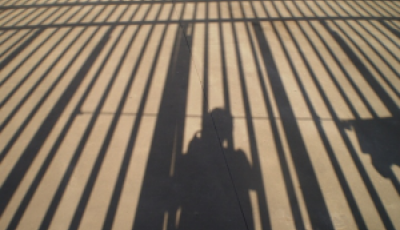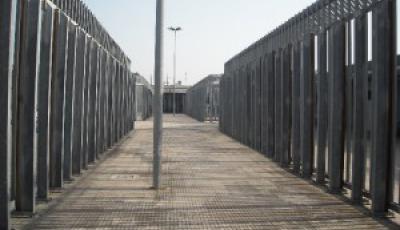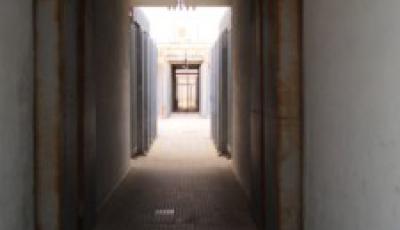The Messiness of Research: My Experience as a Young Female Researcher at an Italian Migrant Detention Centre
Posted:
Time to read:
Post by Francesca Esposito, Doctoral Candidate in Community Psychology, ISPA-University Institute, Lisbon

I’ll always remember the feelings that arose the first time I entered Ponte Galeria. It was 2009, and I was working for BeFree Social Cooperative, a feminist NGO in Rome engaged in combating violence against women. We were allowed into the CIE to meet the migrant women held there and provide them with legal and psycho-social advice. I remember the large and rusty entry-gate as well as the many gates (physical and symbolic) I had to pass through… It was an emotionally taxing―but at the same time enriching―experience that indelibly marked me. It taught me that ‘sisterhood between women,’ an ideal very dear to me as a feminist, can be difficult to achieve when other salient identities, apart from gender, are at play. In the context of the CIE, my identity as a white, native, member of the dominant group was especially important.
Some years later, I crossed that entry-gate again, as well as the many gates beyond it, this time as a doctoral student engaged in a research project on life in migration-related detention that seeks to document the noxious effects of such oppressive systems.

My insider/outsider status continuously shifts across time, space, and relationships. My gender identity, age, and professional status influence my positions within the research field as well as the relationships with different individuals and groups in the CIE. As a woman, I’m not allowed to access male areas without an escort of male security officers, being considered ‘vulnerable’ and ‘at risk.’ Like most detained women (except sex workers, Roma, and ex-prisoners who are considered to be ‘dangerous subjects’), I am ‘a potential victim’ and so ‘in need of protection.’ As Gabriella Alberti notes in relation to migrant women detained in Lesvos, Greece, ‘the regime of “gendered detention management”’ works to reproduce women’s vulnerability, while attempting to silence their voices as political subjects. My experience reveals the workings of this ‘technology of gender,’ using the words of Teresa De Lauretis. I have often been mistaken for a master's student. Although irritating, such a ‘harmless status’, rendered even less alarming by my gender, set some staff, particularly security officers at ease, encouraging them to disclose confidential and controversial information.
My relationships with detained migrants are also personally challenging. My identity as a native-born Italian citizen, and my privileged status as member of the dominant group, has, at times, made it difficult to establish connections and relationships of trust. During the long conversations held in the ‘rooms’ or in the corridors of the CIE, migrants’ discussions frequently addressed the ‘injustice of being confined just for their migrant status,’ including me in the group of the oppressors, the Italians, who made them suffer ‘due to racism and xenophobia.’ ‘Italy wicked! This place is no good!’ a Nigerian woman once shouted at me, it’s ‘because we are black, that’s why Italian treat us like this! Like animals!.’ It’s not easy to deal with the anger, frustration, and distress of people who identify you with the dominant group responsible for their suffering. It's also not easy to overcome their diffidence and mistrust―the main emotional dimensions within the CIE―and to build collaborative and open relationships. A key, resonating questions is Why should you be different? It’s been hard for me to accept this accusation, especially from detained women, as I had hoped that sharing the same gender identity, would enable empathy and reciprocity . With male detainees instead, apart from the constraints imposed by my reduced mobility in their areas and the challenges also faced with women, the main difficulty relates to their use of masculine power to challenge our relationship.

During this process, which is ongoing, some relationships became so strong that they continue after detention. I’m still in contact with many men and women who keep me informed about their lives. New technologies help: Facebook and WhatsApp make it easier to share information regardless of where we are in the world. I communicate with those who are still detained over the phone or via text message. (Unfortunately, there are no internet connections or computers available inside the CIE.) Some detainees/ex-detainees have become long-term participants, actively involved in the development of the research.
In the oppressive context of the CIE, I have learned that by being an honest and passionate witness, it’s possible to create meaningful human relationships. Even so, it’s necessary to engage in an ongoing exercise of reflexivity, to continuously reexamine and reposition myself and become more sensitive and able to navigate power differentials endemic in research relationships, especially in sites of confinement like this one. Fieldwork is messy and personal, hence, as feminists argue, political.
To learn more about the topic of this post, please see my forthcoming article entitled ‘Practicing Ethnography in Migration-Related Detention Centers: A Reflexive Account,’ in the Journal of Prevention and Intervention in the Community, in a thematic issue edited by C. Arcidiacono and M. Aber.
Any thoughts about this post? Get in touch with us! Send us an email, or post a comment here or on Facebook. You can also tweet us.
__________
How to cite this blog post (Harvard style):
Esposito, F. (2015) The Messiness of Research: My Experience as a Young Female Researcher at an Italian Migrant Detention Centre. Available at: http://bordercriminologies.law.ox.ac.uk/the-messiness-of-research-migrant-detention/ (Accessed [date])








